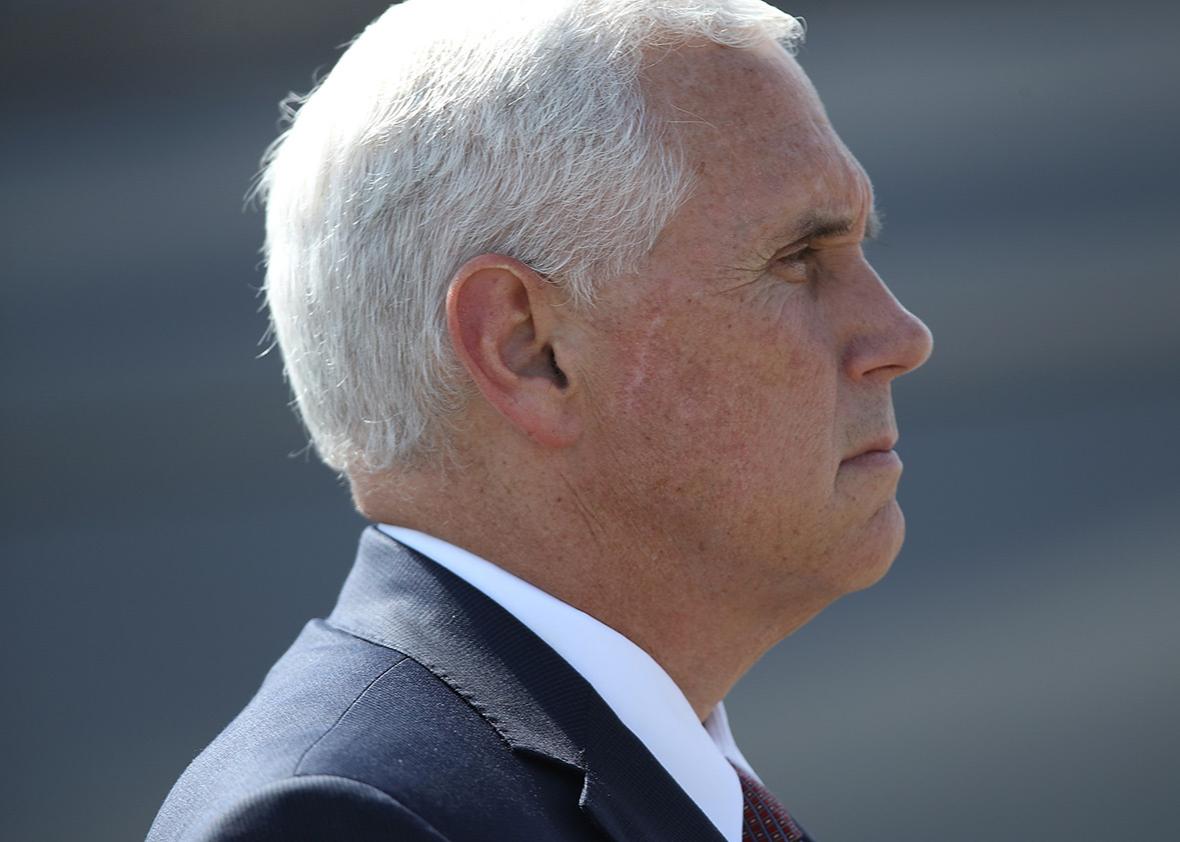Vice President Mike Pence finds it “disgraceful and offensive to me, my family and our entire team” that the New York Times has looked at some of his recent moves and determined he is quite obviously laying the foundation for a 2020 presidential bid should the gig open up. “Whatever fake news may come our way, my entire team will continue to focus all our efforts to advance the president’s agenda and see him re-elected in 2020,” Pence said in a statement. “Any suggestion otherwise is both laughable and absurd.” It’s getting to be that a guy can’t court major party donors, make unusual appearances in Iowa, set up his own outside fundraising operation separate from the president’s, hire a presidential campaign operative as his first chief of staff, and “intimate” to donors that he’s protecting his future political interests anymore without attracting suspicions that he’s protecting his future political interests. How untoward, New York Times!
Pence fired back so vociferously, most likely, because of two reasonable fears: that President Trump’s supporters would accuse him either of garden-variety disloyalty or some sort of a more elaborate double game to undermine the president. But Pence isn’t about to primary his boss. What Pence is doing is ensuring that if for whatever reason Trump opts not to run in 2020—say, hypothetically, that an overwhelming legislative record of nonachievement, collapsed support on Capitol Hill, historically low approval ratings, and federal indictments of campaign and White House officials forces him to declare he’s sick of winning and bow out—then the party will belong to him. Of course Pence and those around him are actively laying contingency plans. It would be malpractice not to do so.
That doesn’t mean that the emergence of a sizeable shadow primary field just a few months into a party’s new presidency is normal. It means the opposite: Even top figures who are publically loyal to the president, like Pence and (as the Times notes) potential contender Sen. Tom Cotton of Arkansas, have no clue how Trump’s historic journey ends, either. Like any right-winger catching a whiff of doomsday, they’re prepping.
Pence’s “schedule is so full of political events,” the Times reports, “that Republicans joke that he is acting more like a second-term vice president hoping to clear the field than a No. 2 sworn in a little over six months ago.” He held court with donors at Iowa Sen. Joni Ernst’s annual pig roast, one of those events that Republican presidential aspirants must pretend to enjoy—but usually the year before a presidential election, not the year after. Speaking of donors, Pence has been inviting them to his residence for dinner. His chief of staff, Nick Ayers, is a political operative who’s never previously worked in the federal government. And the day after it was reported that fired FBI Director Jim Comey kept memos of his interactions with Trump, Pence set up his own fundraising vehicle, the Great America Committee.
Pence has to deny that this has anything to do with, say, gifting the Republican Party to himself. To publically acknowledge these contingency plans would be to publicly acknowledge how poorly Plan A is going, which might displease a president who is keen on loyalty tests. But “multiple advisers to Mr. Pence have already intimated to party donors that he would plan to run if Mr. Trump did not,” the Times reports. That sounds like a pretty serious Plan B.
Other would-be candidates have followed Pence’s lead. Cotton, one of those ambitious young senators who’s been studying presidential precinct data since he was in the womb, attended a Pottawattamie County Republican Party fundraiser in Council Bluffs, Iowa, in May. One does not visit county GOP fundraisers in Iowa for kicks, and Cotton would have understood exactly how his appearance would be interpreted. The Times also takes note of Republicans less loyal to the president, like Ohio Gov. John Kasich and Nebraska Sen. Ben Sasse, who also have been making early noises.
The most telling sign that this early gamesmanship is real is the denial Trump spokeswoman Lindsay Walters gave the Times. “The president is as strong as he’s ever been in Iowa,” she said, “and every potentially ambitious Republican knows that.” If the president’s team were certain that this early jockeying was “fake news,” as Pence called it, then the statement would read something like “we won’t dignify that with a comment” or “that’s the dumbest thing we’ve ever heard.” Instead, Walters felt it necessary to make a projection of strength about Trump’s numbers in Iowa and warn against a challenge.
There won’t be a viable direct challenge against Trump as long as his approval rating among Republican primary voters remains strong. The question is about what happens if those numbers collapse (which still, per the Fifth Avenue Principle, feels like a long shot). Ambitious Republicans, led by Pence, are making preparations for that hypothetical day in 2019 when Trump, sensing defeat, decides he’d rather spend his days leasing out his name and golfing on his own dime. That may sound equally if not more naïve than the campaign-season popular wisdom that Trump didn’t actually want to win the election. But the idea that the Trump phenomenon can’t last didn’t die on Nov. 8. And the belief that there’s no way it dies a normal political death afflicts not just Democrats assuming impeachment is just around the corner but mainstays of the Republican Party, too. Trump exiting early may be a fantasy. But it’s just adjacent enough to reality that even his second-in-command is taking steps to prepare for it.
